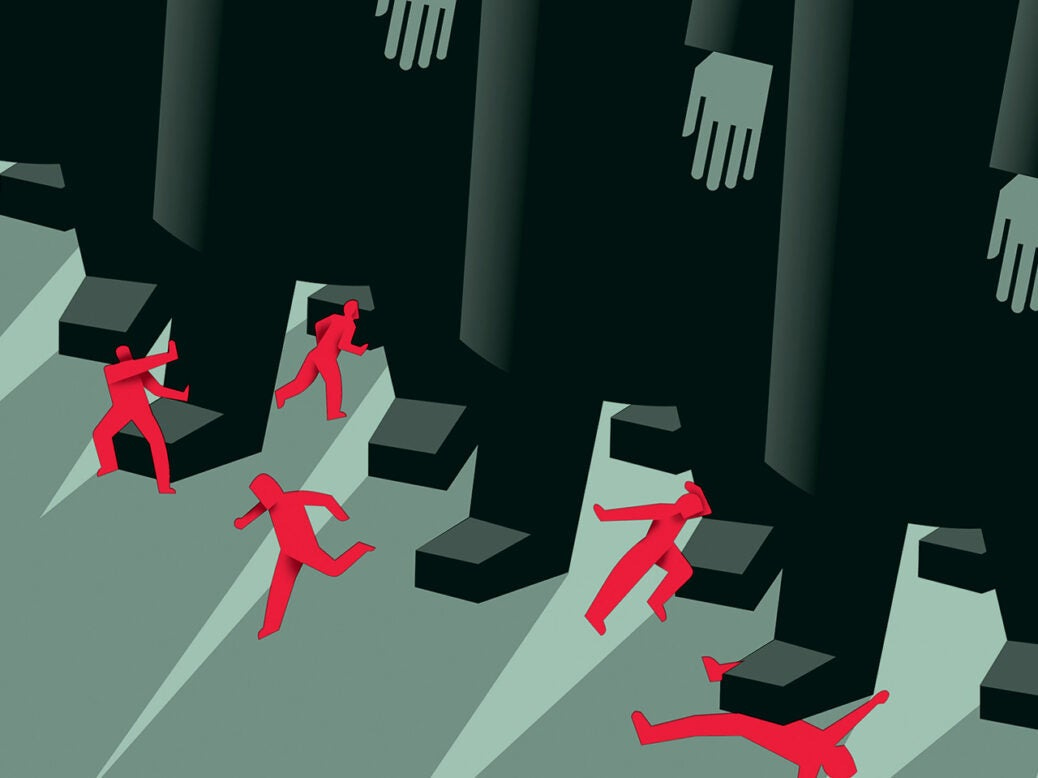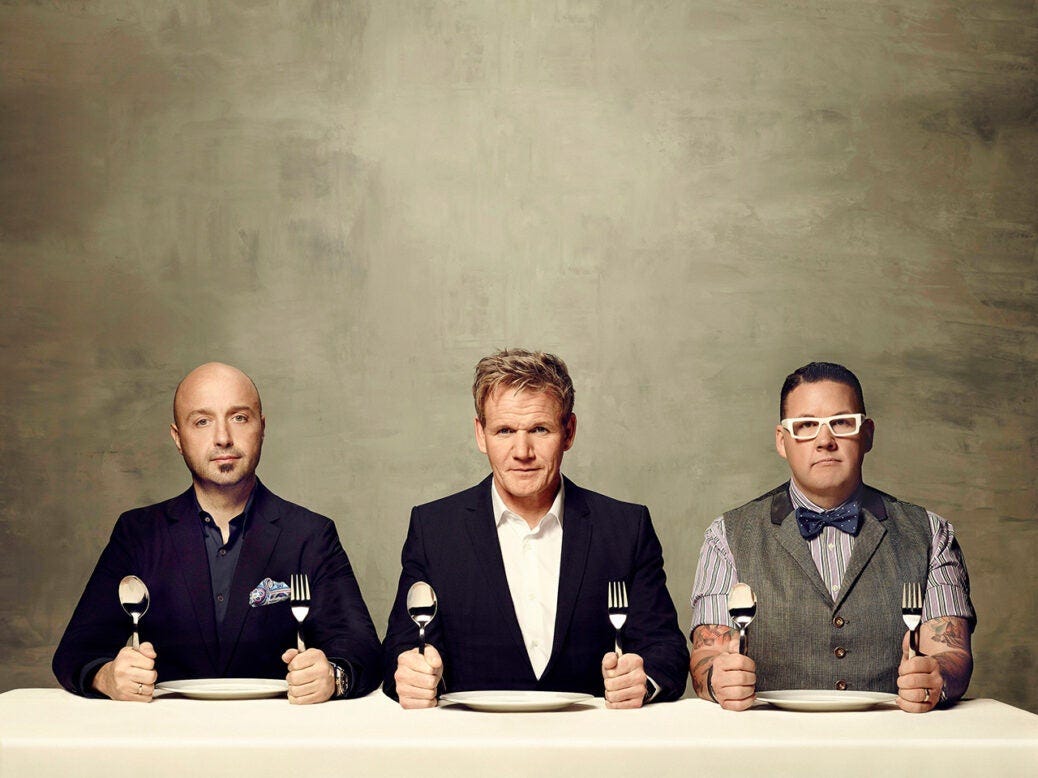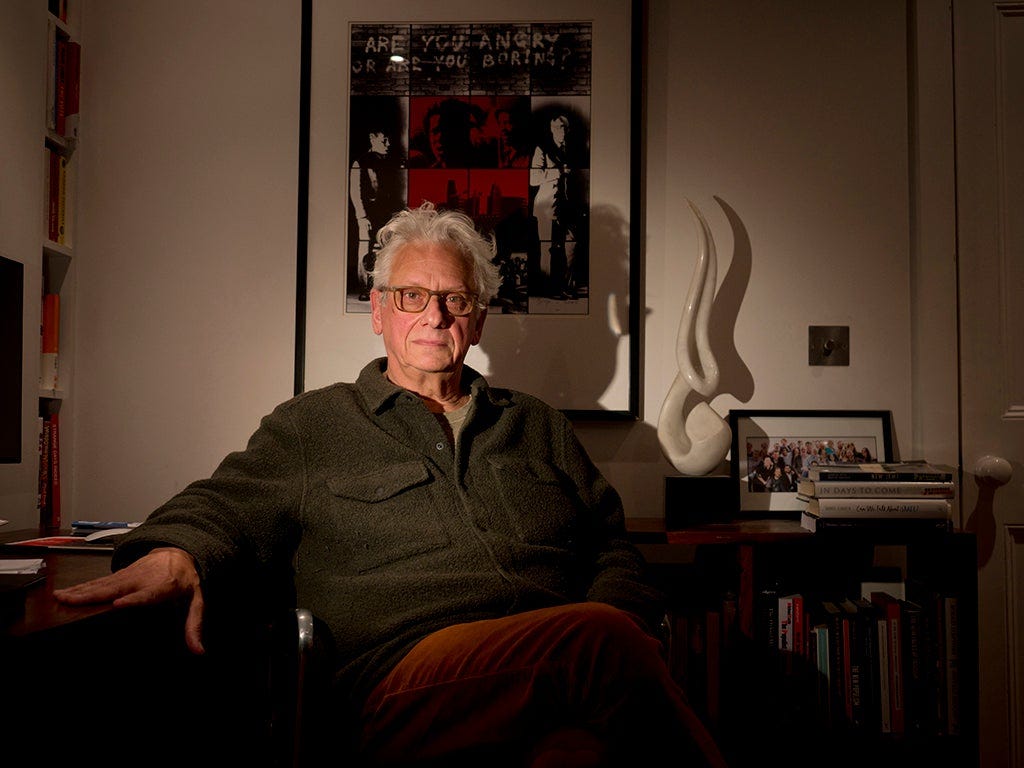The Saturday Read: Fellow travellers
Inside: Nine picks, a tenth from the past, and a couple of codas.
Good morning, and welcome to the Saturday Read, the New Statesman’s weekly guide to the best writing on ideas, politics, books and culture. This is Harry, along with Will.
If this email cuts off midway, you can click here to read it online. If these pieces intrigue, perhaps you’d like to try a trial subscription to the NS. Read three free articles after registering on our site. A digital subscription is only 95p a week. And if you already subscribe to the NS, thank you for being a reader of ours.
1—“American primacy is dead, and the US has become a doddering, weak giant.”
For our weekend essay, Malcom Kyeyune reveals the “shadow war” in the Middle East. The US military finds itself under increasing attack in the region. The empire is not striking back. It is scarcely even acknowledging the pressure it is facing. WL
The fighting against Israel – Hezbollah’s salvos into northern Israel, for example – has dominated the media coverage, but the fighting against the US has been barely discussed. The omission is curious since the American military crisis is historically more significant than the one in Israel: the US maintains dozens of bases in the Middle East, including redoubts and outposts in Iraq and Syria, two countries that de facto belong to the hostile Axis of Resistance.
These American bases are under constant rocket, drone and missile attack, and the US has been slow in responding. While sporadic attacks on US fortifications have been happening for years, the “new normal” of barrage – sometimes more than half a dozen separate incidents a day – is unprecedented. What’s more, it’s clear that the US Department of Defense is trying to downplay and even hide the seriousness of what is taking place.
2—“How much is the US, Israel and Europe are prepared to risk politically to support those in Israel?”
John Jenkins, the former British ambassador to Saudi Arabia, explains the Iranian long game behind the 7 October attack on Israel, and details the origins of the Islamist movement imperilling the Middle East. WL
As President Barack Obama once remarked, it was possible to imagine Iran agreeing to share the region with others. Since the Hamas attack of 7 October that view now looks naive. To understand why it ever seemed plausible we should consider the ideological underpinnings of the Islamic Republic.
Islamism is not traditional. It is intensely modern. Its impulses – against colonialism, imperialism, the desacralisation of the world, instrumental reason and vulgar consumerism – reflect at least in part the influence of the Western counter-Enlightenment tradition that stretches from Herder and Fichte through Nietzsche to Marcuse, Deleuze and Foucault (who claimed in 1978 to detect in the Iranian Revolution the emergence of a “political spirituality”). Its organisation – secretive, cell-based, authoritarian, vanguardist – is Leninist.
3—“As democracies become more anarchical and chaotic, the dream of intelligent tyranny has returned to haunt them.”
John Gray takes the temperature of Western societies in his column this week. Increasingly “unhinged and too lacking in vitality to collapse” Gray identifies a longing among advanced nations for enlightened despotism. WL
Tyranny once again exerts a seductive charm, and not only on intellectual elites. Millions of young people identify with movements that repress the freedoms they take for granted. Ardent believers in sexual liberation can be found demonstrating in support of Islamist regimes that ban gay sex. Sympathy with its enemies has become an integral part of the mass psychology of progressive liberalism. In the 1930s, fellow travellers could argue that the Soviet Union was attempting, however brutally, to realise modern Western ideals. Today, far larger numbers of progressives are allies of movements that despise everything the modern West stands for.
4—“In the decade since Facebook and Google gobbled up the news, most journalists in the UK simply stopped reporting.”
Britain’s biggest commercial news publisher, Reach, cut 450 jobs this week (about 10 per cent of the company). For our weekend essay, Will Dunn delves into how local newspapers have been felled – and are being revived in strange new counterfeit forms. Read on for an investigative journey. HL
This summer, people in the Peak District awoke one August morning to find copies of the High Peak Reporter waiting on the doormat. The paper delivered local news, all of it refreshingly positive: the front page led with the announcement of an upgraded rail line, while other articles reported “more police on the beat” and “extra skills investment”. But its presence would have come as a surprise to many readers. No one had subscribed to the Reporter since it closed, after more than a century in business, in 1998.
The truth was that this was not a real newspaper but a zombie – a piece of promotional material created for the local Conservative MP, Robert Largan, by a company in nearby Manchester. As such, it was just the latest example of how the local newspaper industry, which has been all but destroyed, is now being replaced. Freed from the oversight of local reporters and editors, businesses and politicians have begun to create their own information networks – ones that look like local news, but which report only the things their owners want the public to see.
Charging up and drilling down. Whilst today we’re mostly in oil & gas, we’re also working to roll out EV charging hubs and recently opened up the UK’s largest public hub in Birmingham. And, not or – that’s our approach. See how bp is backing Britain.
5—“Roger Lewis’s ideal reader will not have heard of Richard Burton and Elizabeth Taylor: it is part of his sense of possession.”
Tanya Gold distils a new book about the lives of the Big Two of another era. (Watch this.) It isn’t really a biography, Tanya writes, it’s a fever dream. HL
Taylor thrived by being selfish: being a child star will kill you. She married too often to be defined by men, Lewis says. She was the “bright-eyed virginal toy bride for Nicky Hilton, the Fifties little woman for Michael Wilding, the broad for Mike Todd, the Jewess for Eddie Fisher, each other’s idea of fun for Burton, the politician’s consort for John Warner, the fellow redneck drug-addict wearing white fringed cowboy boots for Larry Fortensky”. She constantly feigned sickness (Marlene Dietrich called it “a manifestation of her tyranny”). Perhaps this is why my favourite Taylor performance is Helen in the 1943 film of Jane Eyre: she died of tuberculosis brilliantly.
6—“Where is the next Oliver? Is Blumenthal still making bacon-flavoured ice cream somewhere?”
Finn McRedmond looks at the absence of a cultural phenomenon of the New Labour years: the celebrity chef. You can find one of them in the Times today (Oliver, naturally), but where is his successor – or Blumenthal’s, or Ramsay’s? HL
We have entered the era of the post-heroic kitchen. The restaurant prevails as the brand over the celebrity’s name (how dated does “Jamie’s Italian” sound!); the chef is a cog and not the selling point of the whole endeavour; the restaurant is its own celebrity, replete with social media accounts and devoted acolytes, just as Oliver once inspired. The London restaurant St John has 263k followers on Instagram. Similarly, the eatery Noble Rot has its own magazine and merchandise line. Yet the chain Jamie’s Italian filed for bankruptcy in 2019.
7—“What she has written is not even a hagiography, but a sort of vibesography, organised in 14 chapters like a Pinterest mood board.”
The “cult of St Joan” (Didion) is to America what the cult of St George (Orwell) is to England. Nicholas Clairmont investigates the phenomenon in the form of a new book on Didion that he finds unfortunately (but deliciously) without virtue. In the course of his critique, Clairmont offers maxims: “dominant media narratives… form for cliqueish rather than truth-seeking reasons”; among writers, “it does not matter at all what political outlook someone has, since the literary is so much higher and more important than the political”. HL
McDonnell writes about Didion’s crystal clear expressions of political conservatism a little like right-wing Catholics write about Pope Francis’s progressivism: incoherently, and with a noticeable desire to move on as quickly as possible from a subject that so obviously demonstrates a contradiction in their core assumptions about the world. McDonnell admits the right-wing elements of Joan Didion’s work and self with palpable reluctance, calling her a “libertarian” instead when she can, while stretching to accentuate her left-wing elements – for example rereading her seminal 1991 essay “Sentimental Journeys”, about the Central Park Five rape case, as a social-justice crusade.
8—“I find it difficult to relate to how much of the left responded.”
George this week interviewed Jon Lansman – who ran the Corbynite activist group Momentum from 2015 to 2020, and worked on a kibbutz in the Negev in the 1970s – on what the left gets wrong about Israel. HL
When did the left’s relationship with Israel fracture? Lansman cited the 1967 war – when Israel occupied the Gaza Strip and the West Bank – and the 1982 Lebanon war as key turning points, but also spoke of a wider political sea change. “It ceased to be a left that had grown out of a broad front between Labour and the Communist Party in the 1930s. The New Left didn’t have a sense of the injustice that had been done to Jews who had migrated to Israel for that reason, they hadn’t lived with Jews as a persecuted people.”
9—“What explains Starmer’s willingness to detonate this internal crisis?”
The left is embroiled in a rolling crisis over the Israel-Hamas conflict. In his column this week, Oliver Eagleton predicts that there may be a serious, anti-war, left-wing challenge to Keir Starmer at the next general election. WL
As a young human rights lawyer, Starmer dissented from military adventures such as the US-led invasion of Iraq. Yet as head of the Crown Prosecution Service, he coordinated the institution’s overseas work – sending prosecutors across the globe to assist anti-drug campaigns and “counterterrorism” operations – with the help of the Obama administration. He learned first hand that the British security state is bound up with the American leviathan, and that loyalty to one implies fealty to the other.
This outlook has now been imposed upon the Labour Party. He has proscribed criticism of Nato among its MPs and followed Biden’s lead on every substantive foreign policy issue, attempting to outflank the Tories in sabre-rattling against the West’s “strategic rivals”. Now, as Gaza is pulverised, he has made sure to align his general approach – full support for Israel’s war aims plus gestural lamentations about civilian casualties – with that of Washington. The orders of the hegemon are sacrosanct. Where Biden dodders, Starmer will follow.
Will’s Best of the Rest
The Hill: Biden and Xi to meet for high-stakes summit.
Telegraph: Nearly 75 per cent of Tory voters back Braverman’s call for protest ban.
NYT: New York City mayor Eric Adams has phone seized by the FBI.
New Yorker: Ridley Scott’s Napoleon complex. Hard to shake the feeling that this film will suck.
BBC: Captain Tom’s family lose spa demolition appeal. Gutted for them!
Pen Vogler: Why the British love strawberries.
Barton Gellman: Peter Thiel is taking a break from democracy. He’s going to be working on a new R&B album instead.
Matthew Parris: Sack Suella or the party’s over Rishi.
Noah Smith: How Ireland got so rich. Is it actually though?
Annie Lowrey: The new meaning of tattoos.
“Brits are third biggest drinkers in the world”. And this in a climate where a double G&T costs about £17.
What the City will look like in 2030. A new era of wind tunnels awaits.
Pick from the past: “Christendom owes a debt to Jewry for the persecutions of the past 1,900 years.” (21 November 1914)
One hundred and nine years ago, when this magazine was only 18 months old, it ran a 2,300-word essay on the future of Palestine (signed only by the initials “AMH”). It makes for fascinating reading today. It treats Palestine as a “relatively uninhabited” land – which Palestinian historians, among others, would contest – and ends with a call for the Jewish people, under the protection of the British, to be allowed to build “a new Palestine on the ruins of their ancient home”.
It also identifies a future tension: “There are 2.6 million Jews in the lands out of which the ancient kingdom of Poland is to be reconstituted. It is obviously not possible for such a huge mass to emigrate.” And it captures an imperial mindset that Palestinians have had to work against for a century: “To give Palestine self-government today,” the author writes, “would be a blunder and a crime.” As a historical artefact, it intrigues.
What we’re reading: Tucker Carlson on Jimmy Carville (1996)
Nick Burns, who wrote a fantastic feature on Blood Meridian that led the Saturday Read this summer, has an essay in the works on Tom Wolfe. We will have that with you soon. Reading a draft of it this week sent me to an unexpected place: the archive of… Tucker Carlson, magazine writer. I was stunned to discover that the man could write – like, really write. He reads like a punchier PJ O’Rourke. Try this interview-profile from 1996 on James Carville, the Dominic Cummings of his day (after the electoral triumphs, before the public ignominy).
When members of the Hotel and Restaurant Workers' Union went on strike at The Palm last fall, Carville took pains to show his solidarity. "I never crossed any picket lines," he says with apparent pride. Of course, that didn't mean he skipped lunch. Carville simply called ahead. When the picketers left, he showed up for steak.
What happened to Carlson? He realised that being the next PJ O'Rourke – or, whisper it, Tom Wolfe – wasn’t that valuable anymore. But being a right-wing conspiracist on America’s leading “news” network was. That’s where he found himself after a journeyman career across cable television. Now he exists on Elon Musk’s Twitter, any sheen of journalistic quality long having washed off of him. HL
Sign up for our weekday political newsletter here:
And with that…
A friend once told me the secret of their vaultingly successful career. It was late at night, and we were not that sober. The secret, they said, was that most people were not very good at their jobs. Most people, frankly, had no idea what they were doing. They could not hide their mediocrity. You merely had to be competent to be better than them. The sole film I’ve seen that stages this secret as a drama is Amadeus (1984). I saw it again on Wednesday evening at the Prince Charles Cinema, which remains the only reason to ever find yourself in Leicester Square.
Amadeus is about the rivalry between Wolfgang Amadeus Mozart and Antonio Salieri. The two composers were opposites in disposition, talent, acclaim. Salieri understands himself to be Mozart’s nemesis; Mozart is just drunk. The former dedicates himself to the destruction of the latter. He achieves his aim, though at the cost of destroying himself too. My friend’s secret might be true. But he had forgotten something Amadeus understands. The mediocre know what they are. How they cope with that awful knowledge is much more responsible for the state of the world than whatever the talented do.
Thank you for reading. Don’t miss out – subscribe to the New Statesman and stay up to date with everything you need: from news and analysis to comment and criticism.
Whether you’re looking for a sharp blog or a finely written feature, the New Statesman has you covered. Have a good week, and catch you next Saturday.
Thanks to Chris Bourn.





















Relating to Amadeus, and the idea that most of us fall into the inadequate/adequate categories fails to recognise that most of the work gets done. Even Salieri managed a career separate from Mozart. The silent majority of us are reasonably competent at the work we do and carry the burden of the lazy, cannot be bothered, time wasters that exist in every large organisation. When Musk tells us that eventually there will be no work to do, he talks through his posterior. Crops will be sown and harvested by machines set up and controlled by programs developed and tested by professionals. Clothing will be manufactured from cloth produced by machines from raw materials controlled by machines controlled by humans. Most raw material inputs will be controlled by professionals. Hospitals and health will remain largely unchanged by AI, as will the Care and Social Work professions.
The Israel-Hamas war. It is becoming increasingly obvious that there is no resolution to this conflict that is worth the slaughter of innocent people on both sides. While it took years for that realisation in Vietnam and Iraq/Afghanistan it is more urgent in Gaza where most of the casualties are innocent civilians. Let us all call out for a ceasefire and an end to the bombing by Israel of suspected Hamas control points. There will be no point in calling for Hamas to release the hostages but the UN and the Arab League should call for the release of all non military hostages, especially the old and young.